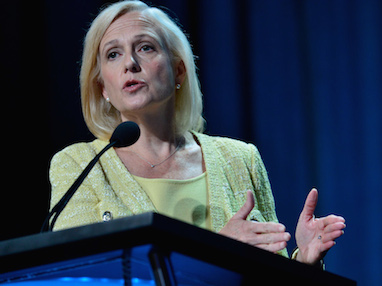Tag: PBS
With on-demand streaming, PBS will enable premiere-week bingeing on Burns’s Roosevelts
In a session with TV critics, PBS's Kerger said the streaming experiment will "accommodate a wide range of viewing habits."PBS press tour highlights Downton, Nas on Finding Your Roots
The stars of Downton Abbey aren’t the only luminaries whom journalists will chat with during PBS’s portion of the Television Critics Association Summer Press Tour ...New digital offerings from NPR, PBS promise closer look at how users consume content
New digital offerings from NPR and PBS aim to give public media additional platforms for building online audiences while gaining insights into ...PBS to track behavior of viewers pledging to core-schedule programs
In an experiment signaling public TV’s resolve to address concerns about the long-term effects of transactional pledging on its donor base, PBS ...Pubcasters welcome Supreme Court decision against Aereo
PBS and New York’s WNET joined major commercial networks Wednesday in hailing a U.S. Supreme Court decision that found the business model ...Expanded budget buoys plans for PBS’s revamped development division
Betsy Gerdeman, who took over as senior vice president of PBS Development in February, is busy rebuilding that staff while focusing on ...Sesame Street to add half-hour show for afternoons
PBS will also offer the half-hour show for mobile devices.In radio appearance, ‘Citizen Koch’ filmmakers allege self-censorship in public TV
The filmmakers behind a new documentary briefly discussed their “deeply troubling” experience with public TV in an appearance on public radio’s On Point Wednesday. Tia ...Friday roundup: Diplomatic showcase features PBS docs; WBUR gets $1M donation
Plus: Reading Rainbow hits its fundraising goal, and a call to boycott NPR.Downton Abbey creator calls PBS delay in season scheduling ‘madness’
Downton Abbey creator Julian Fellowes has weighed in on PBS’s decision to delay airing the Masterpiece megahit for months after each season premieres in Britain. And ...Tuesday roundup: Pubmedia inspires poetry volume; ESPN prez responds to Kirk’s “whining”
• I think that I shall never see A poem lovely as Wait Wait … Don’t Tell Me! Granted, that’s probably not among the verses ...Winslow of NewsHour sees need for greater investment in public TV’s news programming
The final installment of our interview with Linda Winslow, outgoing executive producer of the PBS NewsHour.Wednesday roundup: PBS ombuds criticizes network’s treatment of Current; Poynter looks toward reinvention
Plus: A WXXI totebag tweets, and a Network Operations Center opens in Florida.PBS’s live-action Odd Squad aims to ‘make math relevant’ for kids
PBS Kids will expand the footprint of its math-focused programs with Odd Squad, a live-action TV series for school-aged children. The new show, which ...Masterpiece Trust secures $3 million gift from San Diego donor
SAN FRANCISCO – Amid previews of upcoming programming at the PBS Annual Meeting, including a groundbreaking 14-hour series on the Roosevelt family ...



